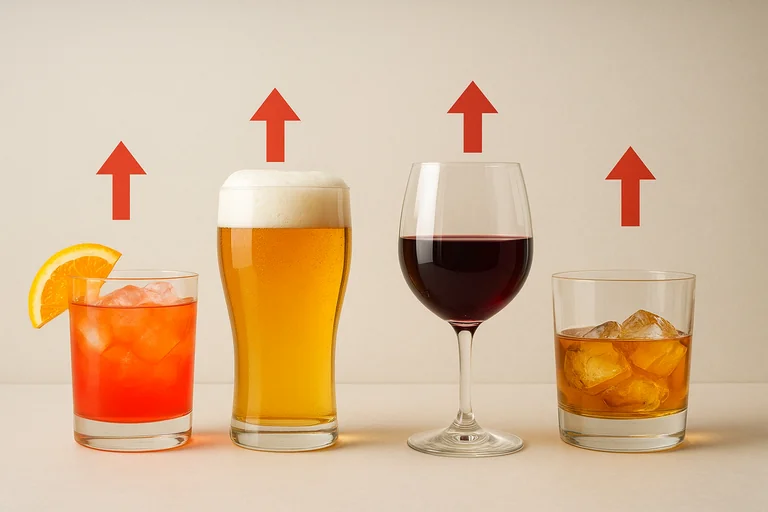A 2 minute assessment to get a personalized mental health or alcohol recovery plan.
Alcohol addiction doesn’t happen overnight—it develops gradually, often unnoticed until it’s severe.
Understanding the stages can mean the difference between effective early intervention and life-threatening consequences.
This isn't theory; it's neuroscience. Research shows addiction changes your brain in predictable stages, and each stage has specific signs, risks, and treatments.
Here's the crucial breakdown you need to recognize—and stop—alcohol addiction in its tracks.
Stage 1: Early Use and Experimentation
Alcohol use typically starts casually, often in social settings. At first, drinking feels manageable. But here's where it gets tricky: genetics and environmental factors significantly influence whether occasional drinking progresses.
Warning signs:
- Drinking to relieve stress or social anxiety
- Increased drinking frequency in social situations
Action Step: Early education and setting personal boundaries can prevent progression.
Stage 2: Regular Use and Increased Tolerance
The shift from casual drinking to regular use happens subtly. Your brain adapts to alcohol, creating tolerance—you need more to feel the same effects.
Warning signs:
- Increased drinking frequency
- Needing more alcohol for the same buzz
- Drinking alone or outside social contexts
Critical Risk: Tolerance indicates neuroadaptation, setting the stage for physical dependence.
Action Step: Brief interventions, lifestyle adjustments, and moderate drinking strategies can halt progression here.
Stage 3: Problematic Use and Dependence
At this stage, drinking negatively impacts life, yet continues. Your brain chemistry fundamentally changes, creating physical dependence.
Warning signs:
- Failed attempts to cut back
- Neglecting responsibilities (work, family, health)
- Persistent use despite obvious harm
Critical Risk: Physical dependence emerges, marked by withdrawal symptoms when not drinking.
Action Step: Professional counseling, peer support, and medications like naltrexone can reduce cravings and prevent escalation.
Stage 4: Severe Addiction and Loss of Control
In severe addiction, alcohol controls every aspect of your life. Drinking isn't about pleasure—it’s about avoiding withdrawal.
Warning signs:
- Complete loss of control over drinking
- Severe withdrawal symptoms (tremors, anxiety, nausea)
- Withdrawal seizures and potentially life-threatening delirium tremens
Critical Risk: Delirium tremens has a mortality rate up to 35% without treatment.
Action Step: Immediate medical detox and comprehensive inpatient treatment are essential.
Stage 5: Recovery and Brain Repair
Recovery is possible even in severe addiction. Your brain can heal—but it takes structured support and time.
What recovery looks like:
- Medical detox to safely manage withdrawal
- Medication-assisted treatments (naltrexone, acamprosate)
- Long-term therapy and support groups
Hopeful Fact: Your brain remains plastic, meaning recovery and healing can continue indefinitely.
Key Factors Influencing Addiction Progression
Understanding your risk helps tailor effective treatment:
- Genetics: About 50-60% of addiction risk is hereditary.
- Mental Health: Anxiety, depression, and trauma significantly increase addiction risks.
- Environment: Stressful situations, peer pressure, and availability of alcohol accelerate addiction.
The Critical Role of Early Intervention
Early recognition and intervention drastically improve outcomes:
- Brief counseling and motivational therapy
- Moderation management strategies
- Medications preventing escalation (e.g., naltrexone)
Your Action Plan: Stopping Addiction Early
- Identify your stage: Recognize your symptoms and seek professional assessment.
- Immediate intervention: Engage counseling, support groups, or medication early.
- Stay connected: Maintain open dialogue with healthcare providers.
- Be proactive: Address underlying mental health or environmental factors promptly.
Understanding addiction’s stages isn't academic—it's lifesaving. Wherever you or a loved one is on this journey, help is available, and recovery is achievable.
Ready to Take Control of Your Drinking?
Drink less or quit, 100% online, discreetly, and effectively.
If you’re experiencing withdrawal symptoms or having thoughts of self-harm, seek immediate medical attention. Call 911 or the 988 Suicide & Crisis Lifeline. This information is educational and should never replace professional medical advice.
References
- The Classification of Alcoholics: Typology Theories - PMC
- Alcohol-Induced Neuroadaptation - PMC
- Delirium Tremens Clinical Presentation - Medscape
- Alcohol Withdrawal - StatPearls
- Neurobiology of Alcohol Dependence - PMC
- Understanding Alcoholism Subtypes - Recovery Village




